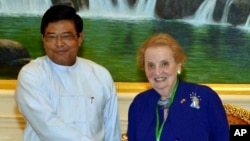Former U.S. Secretary of State Madeleine Albright has praised Burma's democratic reforms while on a visit to the commercial capital of Rangoon.
Speaking to VOA's Burmese service at Rangoon University on Tuesday, Albright said she believes the reforms introduced since Burma ended decades of military dictatorship in 2011 are unlikely to be reversed.
"The sense that I got from all the various groups that I talked to was that while they see problems, they also are trying to figure out solutions and trying to find ways that they can learn from their own mistakes but also examples from other countries, so I think that they are on the right track," she said.
Albright is making her first visit to Burma since 1995, when she was serving as U.S. ambassador to the United Nations.
In recent days, she has been meeting Burmese officials, politicians and civil society groups in her role as chairwoman of the U.S. National Democratic Institute, a U.S. government body that promotes democracy in developing nations.
Albright said the United States has done a lot in recent months to support Burma's reform efforts, from easing sanctions to exchanging visits by each country's president. She said her institute also has been training lawmakers and political party members in Burma and hosting Burmese on U.S. exchange programs.
Albright said the United States should not be the only country encouraging reforms in Burma.
"They need the support of the international community. They need to have a variety of different help, whether it is in training and education, some [help] obviously in investment and economic assistance. They have a very, very large gap between the rich and the poor and [Burmese] people have expectations. So, they have to figure out how to meet those expectations," she said.
The former top U.S. diplomat also called for boosting the political and economic role of women in Burma, where only 33 women serve in the 440-seat lower house of parliament.
"I say that not just because I am a woman and a feminist, but because we know that when half of the population is female and you don't use their talents, then you are wasting a resource," she said. "And so I think that women have to be in political life, women have to own businesses, hep in economic life and men need to understand that it is better for the country."
Albright ends her five-day visit to Burma Wednesday. She met with Burmese opposition leader and Nobel Peace Laureate Aung San Suu Kyi in the administrative capital of Naypyidaw on Monday.
Speaking to VOA's Burmese service at Rangoon University on Tuesday, Albright said she believes the reforms introduced since Burma ended decades of military dictatorship in 2011 are unlikely to be reversed.
"The sense that I got from all the various groups that I talked to was that while they see problems, they also are trying to figure out solutions and trying to find ways that they can learn from their own mistakes but also examples from other countries, so I think that they are on the right track," she said.
Albright is making her first visit to Burma since 1995, when she was serving as U.S. ambassador to the United Nations.
In recent days, she has been meeting Burmese officials, politicians and civil society groups in her role as chairwoman of the U.S. National Democratic Institute, a U.S. government body that promotes democracy in developing nations.
Albright said the United States has done a lot in recent months to support Burma's reform efforts, from easing sanctions to exchanging visits by each country's president. She said her institute also has been training lawmakers and political party members in Burma and hosting Burmese on U.S. exchange programs.
Albright said the United States should not be the only country encouraging reforms in Burma.
"They need the support of the international community. They need to have a variety of different help, whether it is in training and education, some [help] obviously in investment and economic assistance. They have a very, very large gap between the rich and the poor and [Burmese] people have expectations. So, they have to figure out how to meet those expectations," she said.
The former top U.S. diplomat also called for boosting the political and economic role of women in Burma, where only 33 women serve in the 440-seat lower house of parliament.
"I say that not just because I am a woman and a feminist, but because we know that when half of the population is female and you don't use their talents, then you are wasting a resource," she said. "And so I think that women have to be in political life, women have to own businesses, hep in economic life and men need to understand that it is better for the country."
Albright ends her five-day visit to Burma Wednesday. She met with Burmese opposition leader and Nobel Peace Laureate Aung San Suu Kyi in the administrative capital of Naypyidaw on Monday.





